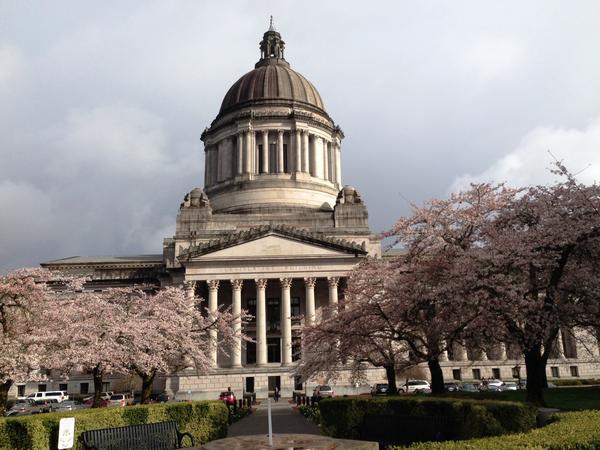
Washington Legislative Leaders Won’t Release Records Related To Education Funding Fix
Listen
Washington lawmakers are working this year to craft a solution to the state’s school funding crisis. Much of their work is happening behind the scenes and in closed door meetings. So who’s in those meetings and who’s trying to influence the outcome? The top four leaders of the legislature denied a public records request to see their emails and calendars.
The February request from The Seattle Times and Northwest News Network asked for copies of office calendars for the leaders of the House and Senate, Democratic and Republican caucuses. The request also sought emails or other communications related to the state budget or education funding.
The official response from a legislative lawyer was, “the Legislature does not have any public records that are responsive to your request.”
Effectively, the lawmakers were claiming an exemption from the state’s Public Records Act.
“It’s not really even an exemption, it’s actually a part of the definition of public record,” said former Republican state Representative Toby Nixon, who now heads the Washington Coalition for Open Government.
Nixon explained there’s a narrow definition of what constitutes a legislative public record.
“And then there’s a large swath of records, basically any records that are in the possession of a legislator, their communications, their calendars, other things they have in their office, that are not considered public records by definition.”
This troubles Nixon.
“Sunshine is the best disinfectant, right?” Nixon said in an interview.
Washington isn’t the only state where lawmakers shield their records from disclosure. Last year, the Associated Press made public records requests of lawmakers in all 50 states. Those requests were denied in part or in full in more than 35 states. Among the states that do require lawmakers to release their records are Oregon and Idaho.
So does Arizona where Morgan Loew works as an investigative reporter at KPHO Television in Phoenix.
“One of the things that I find interesting about lawmaker emails and one of the reasons I think they’re so important as public records is they give you an idea of the mindset of the lawmaker and the intent behind legislation,” Loew said.
For example, in 2010 Arizona made national headlines when the state legislature passed SB 1070 to require local police to enforce immigration laws. The U.S. Supreme Court later struck down key portions of that law. But at the time Loew wanted to know what was happening behind the scenes in the office of state Senator Russell Pearce, the prime sponsor of SB 1070. Loew requested the senator’s emails.
“And what we found out from his emails was that he was preparing to author another bill that would take away birthright citizenship here in Arizona,” Loew said.
That became a story on the evening news.
In Washington, nothing prevents lawmakers from voluntarily releasing their emails and calendars. But the four legislative leaders, through their lawyers, declined to do that.
The lawmakers also declined our requests for interviews for this story. Speaker of the House Frank Chopp issued a one-line statement: “I’m open to reviewing how the Public Records Act applies to the Legislature after session adjourns.” House Republican Leader Dan Kristiansen says he’s open to that too. Senate Majority Leader Mark Schoesler and Minority Leader Sharon Nelson offered no comment.
This year, the Washington House is advancing legislation related to another public records issue. Sponsored by Republican Terry Nealey, the bill would let local governments deny some broad requests for public records and charge fees for others. Nealey said he’s trying to relieve cities and towns from harassment and expenses. Asked if legislative records should be public like local government records are, Nealey said he has those same concerns.
“And so that’s why I’m a little extra cautious on how we design it to fit the legislature,” Nealey said. “But having said that we’re just like everybody else so we need to be treated like everyone else.”
One thing is clear: public records and the legislature are a touchy issue. Former state Representative Toby Nixon said when he was in the legislature he was pressured to withdraw a bill he introduced to require that legislative records be made public.
“I wouldn’t say it was a threat, but my [ranking committee member] position was at stake … and so I withdrew the bill,” Nixon said.
This story was reported in collaboration with The Seattle Times
Copyright 2017 NWNews. To see more, visit NWNews.
Related Stories:

Programas Head Start reabren en el centro de Washington
Más de 400 niños de varias comunidades del centro de Washington regresaron a sus aulas tras la llegada de los fondos federales para los programas Early Head Start y Head Start de Inspire Development Centers.

One woman finds healing by caring for wild animals on the Palouse
Haku the pig, a resident at Palouse Wildlife Rescue and Rehabilitation, draws lots of attention from visitors. (Credit: Ryan Law) Listen (Runtime 3:49) Read It’s dark inside this large red

Head Start programs reopen in Central Washington
More than 400 children in Central Washington are returning to their classrooms following the arrival of federal funds for Early Head Start and Head Start programs at Inspire Development Centers. The organization offers early childhood education programs to low-income children through various centers.












